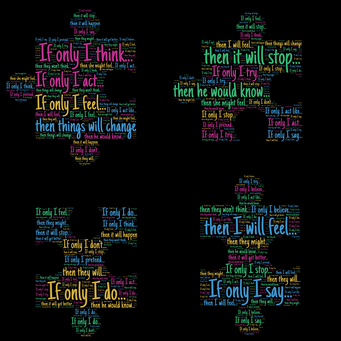Off the Hook - Understanding the Link Between Perfectionism and Stress When it Comes to Success10/18/2016  We have over 70,000 thoughts a day and for many of us it can feel like we are listening to a broken record of painful messages. How often do you criticize or judge your self, tell your self that you have to be hard on your self or you won’t succeed? Are you afraid to let your self off the hook, even just a little, for fear that if you do then you will become lazy or give up and you won’t do well, get in shape, succeed at work, impress someone, be likeable or valuable, etc.? Do you feel guilty about wanting to take a break or slow down? Are you uncomfortable having compassion for your self or taking in compliments? If so, then you are not alone. These self-critical strategies may have seemed effective at one time, however, they can create a tremendous amount of stress and anxiety, sapping your energy and joy from life. You might say to your self “It has to be perfect!” or “I can’t make any mistakes” or “If I rest and take care of myself then I am lazy and worthless!” It’s as if we walk around with an enormous gavel over our heads hanging by a thread, just waiting to slam down upon us. Yet, we are the ones holding the scissors, cutting the thread, and inviting the crushing blow of self-judgment. We would rather endure exhausting days filled with doing too many things rather than slow down and listen to our bodies and our gut when they say, “that’s enough.” We become attached to this harsh way of thinking about our selves and erroneously attribute it to our success. Therefore, we feel afraid to stop and try something else, like compassion, acceptance, or saying “no.” It takes strength, courage and vulnerability to be willing to try a different approach to life. I have worked with many clients with this very issue and have seen them improve their quality of life and enjoy success while also being kinder, more compassionate and patient with themselves. I have witnessed their tremendous and inspiring growth as they set boundaries, learn when to delegate, and invest in self-care while achieving their goals. When you are being harsh and self-critical and it is causing stress you can ask your self if you would talk to or treat your best friend, partner, or child that way. If the answer is “No!” then it is a good reminder that you are likely being far too hard on your self. You can build awareness of your ongoing negative cycle of thoughts and cultivate a different way to respond to stress and challenges by using Mindfulness and Cognitive Behavioral strategies. How different could we feel if we loosen our grip on extreme and perfectionistic thinking and instead strengthen our impulse to be curious, compassionate and more objective? What if we experiment and test our assumptions about how perfect we think we need to be? Would you be willing to start small, for example, and take that lunch break or that 10-minute walk instead of going non-stop and see what happens? After working with so many clients who have let themselves off the hook and enjoyed the freedom, energy and happiness that comes along with it I am confident that you can do it too. Connect with me today to learn more about how I can help.
0 Comments
"I'm late! I'm late! For a very important date!"The White Rabbit from Alice in Wonderland could be the mascot for so many of us who are driven by discomfort or anxiety to escape this moment and get to the next in a hurry.
How many times have you caught yourself replaying memories in your head, or thinking about what comes next, rather than experiencing what is going on right now? We suddenly realize that we missed our freeway exit or find ourselves abruptly sucked back into a conversation that our mind had wandered away from, unsure how to respond, when someone asks "Don't you agree?" Planning for the future and reminiscing about the past are natural and can be important and enjoyable experiences. However, when it gets to the point that we are uncomfortable with allowing ourselves to be fully present in the moment and open to whatever thoughts and feelings arise, then we become trapped in a vicious cycle of constantly pushing forward or looking back and we miss what is happening right now. It may feel as if we allow ourselves to slow down, then our past, or the thoughts and feelings that we would rather ignore, will catch up. Constantly being on the go, jumping from one thing to the next, whether physically or mentally, may bring immediate relief but it can become physically and emotionally exhausting in the long run. The good news is that when we recognize that "Go, go, go!" has become our go to way of living, then we are one step closer to figuring out how we can relax and become comfortable with the present. There are many excellent techniques and skills to help go beyond tolerating being in the moment and toward having a chance to live in and enjoy the moment. Once we are aware of our patterns and motivated to improve our quality of life, then we can begin to take advantage of the numerous skills and techniques available to help us do so. Mindfulness practices, relaxation, and Cognitive Behavioral Therapy (CBT) are a handful of approaches that can be effective in helping people overcome anxiety and feel better. If you are tired of being in overdrive, fueled by anxiety, and are ready to try something new, then connect with me today for a free telephone consultation. We can talk about what I offer and how I might help you overcome your anxiety and enjoy the moments that fill your day. We breathe all day every day, but taking a moment to breathe, purposefully, rarely happens in our fast paced schedules. We are too busy working, driving, taking care of the kids, preparing for a meeting, shopping at the market, doing homework, preparing our taxes, taking care of a loved one, grading papers, walking the dog, doing laundry, and making ends meet. Yet, our breath is one of the most effective and powerful tools that we have to combat stress and relax. It is always with us wherever we go and is invisible to the rest of the world when used as a tool for relaxation. It's like our secret weapon. Unfortunately, it is one that we allow to gather dust in our toolbox of coping strategies. When we are anxious or stressed we may begin to breathe rapidly, drawing in quick and shallow breaths. During a panic attack this rapid breathing can lead to hyperventilation, which can increase panic symptoms and anxiety, leading to even faster and shallower breaths. Thus, a vicious cycle is created. Increasing awareness about our bodies and our breath can help us regain control of how we feel. How do the muscles in your shoulders and neck feel now? Is your jaw clenched? Checking in with our body provides an opportunity to gauge our current level of stress and to take charge and relax when we are aware that we are tense. For those with panic attacks, paying attention to our bodies can seem frightening, particularly noticing our heart rate, body temperature, and breathing. However, learning about our bodies and our response to stress provides an opportunity to understand them better and to eventually be able to better decipher when we are panicking from when there is truly a medical issue that needs attention. Once we are aware of our stress and anxiety building, whether from a stressful day at work or panic symptoms beginning to grow, then we can do something about it. Checking in with our bodies in the moment allows us to stop the cycle of stress leading to greater physical strain and emotional discomfort. However, please note, if you are experiencing difficulty breathing check in with a doctor to make sure that there is not an underlying physical cause. I invite you to try an experiment with me now: Place one hand on your upper chest and one on your lower abdomen below your belly button. Try not to change the way you have been breathing. Instead just notice which hand rises and falls more with each breath. Is it the hand on your chest or the one on your stomach? Are you taking deep abdominal breaths or shallow breaths in your chest? Deep breathing occurs when the hand on your abdomen rises and falls more than the hand on our chest, as our diaphragm expands and contracts with slow, deep breaths. To take a deep abdominal breath imagine a balloon in your abdomen. Visualize sending air into the empty balloon as you take a slow, deep breath in. Send the breath past your chest all the way down to your stomach, filling up the balloon and causing your abdomen to expand. Then slowly let the air release as you exhale. Picture the balloon deflating as you gently breath out. As I said before, we are constantly breathing, every second, but rarely aware of how we are breathing or purposefully using our breath to our advantage. So, let's take 5. The 5-5-5 breath can be an excellent tool to increase relaxation and decrease anxiety and stress. This is a technique I have use with many individuals as a coping skill for stress, anxiety, panic attacks, and PTSD as well as those practicing Mindfulness. 5-5-5 Breath Begin by adjusting your body where you are sitting to get into a comfortable position. First: Slowly take in a deep abdominal breath, imagining the balloon in your abdomen becoming full, as you count from 1 to 5 slowly inhaling. Becoming aware of any tension in your body or stress. Next: Hold your breath at the top to the count of 5, or less if five seconds is difficult, when you have taken in a full, deep breath. Finally: Slowly release the air and exhale as you count from 1 to 5. Imagine your muscles relaxing as you exhale. You can focus on counting to 5 each time or repeat a word that you find calming such as "relax." That's all there is to it. Five seconds in, a five second pause, and five seconds to release. Just 15 seconds to complete one full cycle of the 5-5-5 breath. You can repeat as many cycles as you need to until you feel your relaxation response increase and your stress response and anxiety decrease. Please note: Learning this technique does not help unless it is practiced and used often. Placing colorful sticker dots around your office or home to serve as a reminder to slow down and breathe may be a good reminder to make time to relax and breathe purposefully. Find your own way to remember to relax and stick to what works for you. Connect with me for a free, confidential phone consultation to make an appointment and begin working together to decrease your stress. If PTSD were a fire, then avoidance would be the fuel that keeps it going.When we experience trauma the incident(s) may haunt us long after the event is over. Stressful thoughts and memories, nightmares, flashbacks, and feelings related to the trauma can seep into our lives months or even years after surviving the incident. This is called re-experiencing and it often leads to significant discomfort and distress. Even though we are objectively safe in the present the fight or flight response may kick in when faced with reminders of the traumatic event. Our first instinct is often to find relief by getting out of the anxiety provoking situation as fast as we can. Escaping a situation or thought that reminds us of the trauma, or avoiding it altogether, may bring immediate relief in the short-term, however, the trauma remains and so does the work that needs to be done.
The symptoms of PTSD: re-experiencing the traumatic event, avoidance of things that remind us of it, and hyperarousal, or feeling on edge, irritable, and excessively watchful of the environment, often signal that there is still work to be done. These symptoms are like the flames of a fire, if we get too close it may feel very uncomfortable. So, we may turn our backs and walk away feeling the heat diminish and our comfort increase with each step further away. However, an untamed fire in the wild spreads. The fire does not put itself out. When symptoms and reminders of the trauma are continually avoided the wild-fire of PTSD grows. Avoidance comes in many forms, such as: drinking or using drugs to numb negative feelings, distraction and keeping busy, isolating from loved ones, staying away from crowded places or anything that is a reminder of the trauma, and not talking about what happened and the impact it has made in one's life and relationships. But when we have the desire to come back and face the heat we can see the whole picture, which puts us in the position to do the work that needs to be done to heal. There are many excellent and effective evidenced based treatments that can help when you are ready, including exposure therapy and Cognitive Processing Therapy. I have worked with many people as they overcame their traumatic past, it can be done, healing can occur when you are ready. Connect with me for a free confidential phone consultation to find out if I am the right therapist to help you heal from your past. |
Author
Dr. Baker is a Clinical Psychologist in Private Practice in Orange County. She specializes in: anxiety and panic, relationship issues, trauma, PTSD, depression, parenting and child behavior issues, Veterans, and more. Click here to learn more about Dr. Baker and her specialties or connect with her today. Archives
October 2016
Categories
All
Disclaimer: Please note, the information offered on this website is not, nor is it intended to be, therapy or psychological advice, nor does it constitute a client/therapist relationship. You should consult a psychologist or medical professional for individual advice regarding your health and well-being.
© 2012-2017 Dr. Amber Baker.
All rights reserved. |
Disclaimer: Please note, the information offered on this website is not, nor is it intended to be, therapy or psychological advice, nor does it constitute a client/therapist relationship. You should consult a psychologist or medical professional for individual advice regarding your health and well-being.
Privacy Policy
Privacy Policy
Lic. # CA PSY24533
© 2012-2023 Dr. Amber Baker. All rights reserved.
© 2012-2023 Dr. Amber Baker. All rights reserved.




 RSS Feed
RSS Feed